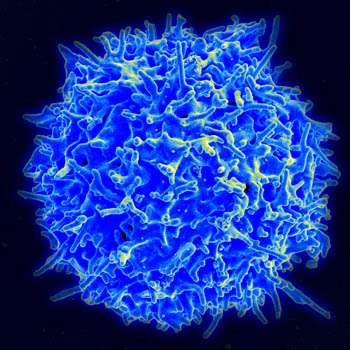Study exposes key requirement for regulatory T cell function

A Ludwig Cancer Research study published online September 5th in Nature Immunology illuminates a key requirement for the function of regulatory T cells—immune cells that play a critical role in many biological processes, from suppressing inflammation and deadly autoimmunity to helping tumors evade immune attack. The findings also unravel the complex role these cells can play in the genesis and progression of certain gastrointestinal cancers.
Researchers led by Alexander Rudensky, director of the Ludwig Center at Memorial Sloan Kettering, applied elegant genetic techniques in mouse models to determine that the receptor for an immune factor known as interleukin-2 (IL-2) is required for the function of regulatory T cells and explored the role it plays in their activity. "Our results have implications for cancer immunotherapy and the treatment of a number of autoimmune and inflammatory diseases," says Rudensky.
Regulatory T cells (Treg cells) suppress the activity of effector T cells, which include cytotoxic T cells that kill infected and cancerous cells and the helper T cells that orchestrate those and other immune responses.
Rudensky and his colleagues and others have previously shown that the generation and maintenance of Treg cells is dependent on the IL-2 receptor (IL-2R). But, so far, researchers have not been able to determine why the receptor is required for their suppressive function. Efforts to delete IL2R genes in mice to answer this question have failed because eliminating IL2R results in a lethal inability to make Treg cells.
To get around this problem, Rudensky and his colleagues genetically engineered mice in a manner that allowed them to develop Treg cells yet permitted the researchers to tease apart the distinct roles played by IL-2R signaling and the IL-2R itself in Treg function.
Treg cells, they found, are absolutely dependent on IL-2R for their function. The real surprise, however, lies in the details of that dependency. While IL-2R signaling is both required and sufficient for Treg suppression of helper T cells, the receptor protein itself appears to play an additional and necessary role in the suppression of cytotoxic T cell activity.
"We found that it's not only signaling through the IL-2 receptor that's required for their control of cytotoxic T cells, but also the receptor's ability to capture IL-2 and deprive cytotoxic T cells of access to this interleukin, which these cells need as well," says Rudensky.
Chronic inflammation is a key trigger of gastrointestinal (GI) cancer and effector T cells play a key role in promoting such inflammation. As part of this study, the researchers examined how manipulating IL-2R signaling in Treg cells influenced the disease in mice that are prone to cancer in the small intestine.
"Our findings suggest that regulatory T cells have a dual role in inflammation-associated GI cancers, limiting precancerous lesions in the early stages but promoting cancerous growths in later stages of the disease," says Rudensky.
The finding opens a window into the role a robust Treg cell population can play in preventing GI cancer. The practical application of such studies is one focus of a $10 million program launched by Ludwig and the Conrad N. Hilton Foundation to investigate dietary interventions for the prevention of GI malignancies.
The current findings also have implications for immunotherapy for GI cancers. "Treg cells limit activation of cytotoxic T cells, which target tumor cells," says Rudensky. "So one way of releasing them from Treg-mediated suppression would be to provide them with interleukin 2 in a targeted manner."
Conversely, a similarly targeted activation of Tregs could prove very useful to treat a range of autoimmune and inflammatory diseases, such as rheumatoid arthritis, type 2 diabetes and inflammatory bowel disease. Rudensky and his colleagues plan to investigate how such targeted delivery or activation of IL-2R signaling might be achieved.
The research was supported by Ludwig Cancer Research, the Conrad N. Hilton Foundation, Japan Society for the Promotion of Science, Lucille Castori Center for Microbes, Inflammation & Cancer, the US National Institutes of Health and the Howard Hughes Medical Institute.
More information: Takatoshi Chinen et al. An essential role for the IL-2 receptor in Treg cell function, Nature Immunology (2016). DOI: 10.1038/ni.3540





















